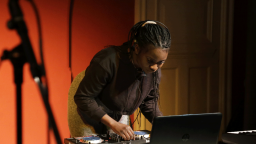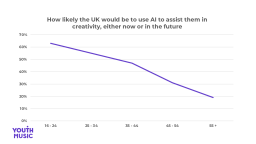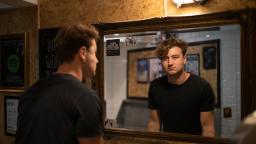
The emergence of Artificial Intelligence (AI) has revolutionised popular culture and begun to cement itself in everyday life, gaining acclaim and critique in equal measures.
As AI’s foothold in the music industry strengthens, there has been an inundation of thoughts and opinions from all sides of the argument. With some questioning whether the explosion of AI programmes could signal the death of creativity, whilst others ask if will bring about a positive new dawn for musicians; there is an uncertainty about what AI means for the industry moving forward.
With conversations around the dangers of generative AI and the creation and distribution of music on the precipice of major change, we sat down with young creatives to understand their perspective of the AI revolution. Two thirds (63%) of young creatives say they are embracing Artificial Intelligence (AI) to assist in the creative processes in music making. This number decreases for each older generation, with only 19% of people aged over 55 likely use AI to assist with their creative vision, highlighting the reticence of older generations to have an open mind about using the technology. Plus, our recent Sound of the Next Generation report revealed that 47% of young people felt that most music in the future will be made by AI.

AI expert, composer and researcher Dr Robert Laidlow of Jesus College, Oxford, also contributed his expertise and insights gained from 5 years’ experience in the field. His work draws on previous decades of research and is concerned with discovering and developing new forms of musical expression rooted in the relationship between advanced technology and live performance.
To cut through the privileged voices that have dominated the conversation and amplify the voices of the next-generation of musical talent, Youth Music reveals how young people are using AI programmes during the creative process and showcases their opinions on the future of the music industry and how AI can equalise access.

How AI factors into young people’s creative process
AI programmes have become ingrained in the workflow of younger creatives, with those interviewed sharing how it has aided in increasing their productivity - whether it had been adopted for years or tested for only a couple of months.
Lewis Dobbs, a third-year media and creative industry student based in Leamington Spa said, “AI allows me to do jobs faster, which was pretty shocking at first, but once I used it over and over again, it became a part of my daily practice and a part of my job. I think in that sense it’s really great when you're allowed to control it and be in charge.”
Tom Auton, a 24-year-old rock artist and producer from Cardiff, agreed and said that AI has helped him finish songs quicker, adding that, “it's helped me expand my vocabulary by looking at different kinds of phrases, different sorts of words than what I would normally use in a song. Sometimes when it's just written there in front of you, by the AI, it makes you look at it in different ways.”
When asked how AI has helped improve her productivity, Jenni, a singer-songwriter from Manchester said that in terms of coming up with ideas, “AI has made it that bit quicker because I've got folders ready to draw inspiration from, or it's thrown out a chord progression that I've really liked. I can then write lyrics from that and now there’s a song that's been written way quicker.”
For some, the eagerness to adopt AI programmes into their creative process comes without the fear that it takes away from their creativity, which is a concern some more established artists such as Nick Cave have been raising. In response to a ChatGPT produced song that was created ‘in the style of Nick Cave’, he said that he does not feel the same “enthusiasm around this technology,” and continued to label the song as a “grotesque mockery of what it is to be human.”
Dobbs commented, “Right now, I consider it to be almost a plaything, something that isn't really overly serious. I think the reason I'm using it now is because I know that it doesn't have the power to take over.
“I wouldn't be basing my work off it; it's mainly a tool and I think you have to be the one to have an original idea in the first place in order for it to really come to fruition the way you like. But I think using AI tools can allow you to get there faster.”
When asked about the impact AI could have on young people’s creative process, composer and researcher Dr Robert Laidlow said, “I would have found it very helpful to have an interactive system to bounce off to foster a creative environment, almost like a video game. Rather than making a piece you might make with an AI, you're making an environment in which you're both coming up with ideas and you're bouncing off things and exploring. I can see that being very helpful.”
Finishing his thought, Laidlow said, “If AI is being used in an intuitive and interactive way, almost like a human collaborator or one that you could just summon up on your computer at home, that'd be very helpful.”
AI as a tool to break financial and accessibility barriers
While unchecked generative AI has caused alarm bells to sound throughout the industry, when used to assist creatives it can be a tool for good and can prove revolutionary in the fight to equalise access to the music industry, levelling the playing field for creatives.
Tech Round claims that, “AI has a more useful role in the editing suite, providing an affordable, fast, easy to use mastering solution for those without access to high-tech studios.”
Although those questioned have used AI programmes directly when creating music, many of the creatives lean on them to remove financial barriers and substantial time commitments when working on their music. This has proven invaluable, especially for students juggling creative passions with other obligations, such as crafting a dissertation or creating music on weekends around a day job.
Tia Talks, a 24-year-old MC, artist and concierge, hailed AI as something that has helped her manage her workload. She stated, “I'm self-managing, and as I was doing so much admin, it was taking away from my time to create and make music, so I thought about ways that I could use it to ease the load that I was carrying.
“It’s just trying to take away tasks from myself and outsource them whilst preserving my budget, because I'm working with small budgets, so I don't have the money to pay an assistant. So that's where ChatGPT has been useful, mostly strategy-based and getting it to write emails for me and other things that I just don't want to think about as an artist.
“Usually, you'd pay for writers to write up things like your artist bio, your press releases, creating a marketing strategy. I'm not having to work with anybody else to do those things. I'm working with the AI technology to do it, which is a lot more convenient because I can get answers quickly and I can withdraw information anytime I want.”
Tee Peters, a 25-year-old music artist and producer from London, has used AI to progress with his career, without the need for major financial commitment in marketing methods. He claimed that, “other than cutting down production time, I think the difference that AI has made to my creative practice is having a selection of assistants that I don't need to pay for to get certain tasks done.
I think AI has helped because it means I don't have to put a massive burden on myself to get the things that I would have to do by myself done. I no longer have to allocate a whole day to something, but I can delegate tasks to the AI.”
He followed this by saying, “even though I’ve got the knowledge, it still takes time to get stuff done and it's really about time, effort or whether you’ve got the money to sort something out. If I don't want to spend too much time on something, I could use a plug-in to finish a couple tasks that I need done, especially with mixing demos.”
Breaking down barriers with the assistance of AI
According to The Guardian, Neil Tennant of Pet Shop Boys has suggested that AI could be a useful tool in a songwriter’s kit and could be used to help musicians overcome writers’ block and finish songs. This has been reiterated by Tia Talks who also uses AI programmes to aid in writing, both when it comes to creating music and distributing media materials around her EP launches.
She said, “I asked ChatGPT a question about how to overcome writers’ block, and general advice on being an artist getting it to advise me based on all of the things that are out there that other artists have said. As well as advice on how I can help myself overcome certain obstacles.”
Echoing this, Tom Auton, who has factored AI programmes into his work recently with the help of Chorus, a song-writing platform that aims to help creatives write more fluently, claims that the use of AI has helped him boost his lyricism. He claimed, “lyrics are not my strong suit. I wouldn't say I'm necessarily weak at them, but I just find that they take me the longest out of the creative process.
“A friend of mine showed me this platform, and said I think you might benefit from something like this if collaboration isn't available. You can type in a lyric or a phrase and it’ll essentially give you anywhere between seven and 10 alternative lyric ideas based off the ones that you've put in. You can input things like what genre you want and how creative you want it to be, which I think is quite interesting.”
Auton explained that he was introduced to the platform as a way to progress his songwriting without the need to wait for help from his peers. This shows how assistive AI can prove invaluable to young people who are at the beginning of their creative journey, who may not have the 24/7 support system that larger artists benefit from.
He continued, “if you have people that you normally write with, and they’re not around, this could be a nice way of prompting your ideas. It actually really, really worked, and I've loved using it.”

The future of the music industry, according to the next generation
Conversations surrounding the future of the music industry are riddled with concerns of creativity being choked by the advance of unfeeling algorithms. These anxieties slot neatly among concerns about automation, that machines will displace people - or, rather, that the people in control of these machines will use them to displace everyone else.
WIRED explored how generative AI can be unsettling because, on a superficial level at least, it exhibits a kind of creativity normally ascribed to humans, but also adds that it is just another form of technology, another instrument.
The NextGen creatives Youth Music interviewed portrayed a more positive outlook on the future of the industry. One where AI is used to assist rather than generate, keeping the aspect of human creativity sacred.
Tia Talks, when quizzed about her thoughts on AI’s future, mentioned: “when the line becomes blurred between what is real and what's not real, using somebody's likeness, it can get out of hand very quickly.
“I think as long as we're able to ensure that the human process of music still is the main process and we allow for AI to be used as a useful tool rather than something that takes over, I think the music industry should be OK. I think fighting back against it is not going to stop it, because AI is going to continue to integrate into our lives more and more.”
In the same vein, Jenni said: “I do think it'll make a lot of independent musicians’ jobs easier, but I don't know if it will replace them. So, I don't think it's the death of it, but more of an addition to the industry.
“People make music and listen to music to relate to other people. For me, if anything bad happens, the first thing I do is put my headphones on because it makes you feel better. I don't think AI can replicate the authenticity of music so I don't know if it's the death of the music industry because I don't think it can do a lot of the things that human artists can.”
Concerns have also stemmed from issues relating to creativity and technology, two seemingly polarising disciplines whose differences have been made even more stark due to AI.
Talking to Complex, a head of A&R stated, “creatives can get lost because they don’t understand how to navigate tech, and the tech people don’t necessarily understand music language.” They continued to explain that this could cause issues as, “tech is not going to stop moving forward, but creativity can.”
Tia Talks echoed this, claiming that the development of AI had been predicted in media texts she had studied during her university course. She said, “The discussions about that kind of thing have been talked about for years and years, a lot of old media texts that we were reading were predicting what would happen with the progression of technology and it is exactly that, that's playing out now.”
She continued, “I’m more for embracing AI, due to my media background. It's something that's going to happen whether we like it or not. So, I think fighting back against it is not going to stop it, because AI is going to continue to integrate into our lives more and more. Things looked very different 20 years ago and 20 years from now they'll look even more different, so I definitely think we have to embrace it because it's the direction that it's going in.”
Dr Laidlow, when asked his thoughts on the direction of the music industry with the continuation of AI use, said, “There’s a lot of scope for people to get into instrument building. This was really huge in the 80s and 90s, people liked using modular synthesisers and building their own sounds and synthesisers, but I don't think people really do that anymore. With young people it’s not such a big thing, but it could become a big thing to build your own instruments with AI, and maybe that will be interesting to see.”
Despite concern from industry stalwarts, with a multitude of conversations around the legalities of building wealth using generative AI, the next generation of creatives are hopeful for a more positive future for their industry. One in which AI is measured and controlled, aiding in bridging accessibility gap between grassroots talent and major artists and labels.
Matt Griffiths, CEO of Youth Music, said: “Whilst the emergence of AI is revolutionising popular culture, established artists and executives have rightly expressed concerns regarding Its long-term impact on the music industries. There are still important questions to be addressed around the monetising of AI and the ownership of content, for example.
"However, what we're hearing right now from the next generation of creatives Is excitement around its potential to equalise access to making, learning and earning in music. Especially those who don’t have the advantage of expensive music education or equipment to aid their learning process, or paid support to run their business. The fact that two thirds (63%) of young people see AI as a useful tool in their creative arsenal, reinforces this idea that there is a future for AI in the creative sphere.
"From their perspective, our research shows that AI Is levelling the playing field, which will ensure a more diverse pipeline of talent entering the music industries."
Interviewees
- Tia Talks – music artist and MC based in London
- Lewis Dobbs – third-year media and creative industry student at the University of Warwick, music artist and producer
- Tom Auton – Cardiff based rock artist
- Jenni Lee-Orlopp – singer-songwriter and producer based in Manchester
- Tee Peters – London based music artist, producer, record label owner and programme producer at a local music charity
- Dr Robert Laidlow – composer and researcher and a Fellow at Jesus College, Oxford University
Sources
- ‘This song sucks’: Nick Cave responds to ChatGPT song written in style of Nick Cave – Sian Cain, The Guardian
- Music Making Machines: How AI is Empowering, Not Undermining, The Music Industry – Dana Leigh, Tech Round
- AI’s disruptive forces are rapidly reshaping the music industry – Anna Nicolaou, Financial Times
- AI songwriting is not a sin, says Neil Tennant of Pet Shop Boys – Jamie Grierson, The Guardian
- AI is not killing creativity – it’s enhancing it – Bernard Marr, Raconteur
- Musicians, Machines, and the AI-Powered Future of Sound – Will Bedingfield, WIRED
- How Will AI Impact The Future of Music? – Michael Epstein, Complex
The research was carried out online by Research Without Barriers – RWB
All surveys were conducted between 2 June 2023 and 7 June 2023
The sample comprised 1,008 UK adults ages 16-24
All research conducted adheres to the UK Market Research Society (MRS) code of conduct (2023)
RWB is registered with the Information Commissioner’s Office and complies with the DPA (2018)
